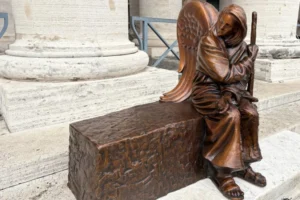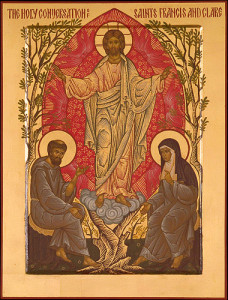August 3, 2025
JOYFUL GOSPEL LIVING
“One’s life does not consist of possessions.”
From a variety of news sources that we choose to get our updates, there is always a vast amount of information that is shared: world and national events; health and science updates; sports statistics; weather forecasts and warnings; arts and entertainment happenings; and business trends that affect investors and employees. The world’s population lives as a consumer society that drives the global economy. Much of that demand is reflected in our possessions: clothing, cars, homes, hobbies, jewelry, collectibles, and lots of stuff that we have accumulated in our lifetime. In the first reading from the Book of Ecclesiastes, there is a wise understanding that it is vanity to imagine that any of these possessions has any importance after death. So, do they even matter in life?
In this weekend’s Gospel, a man approaches Jesus to get an opinion on a family inheritance. Jesus speaks to the crowd around Him when He replies: “Take care to guard against all greed, for though one may be rich, one’s life does not consist of possessions.”
Jesus then tells the parable about a rich man who had such a bounteous harvest that he needed to build larger barns to store it. Little did he realize that God was watching him critically. We can only imagine what the crowd heard in that parable: “You fool, this night your life will be demanded of you; and the things you have prepared, to whom will they belong?” What did Jesus mean when He spoke about storing up treasures that are ‘rich in what matters to God’?
Why are people so fascinated by the lifestyles of the rich and famous? There have been many news stories this year of the lavish lifestyles of rich people that are beyond our imagination. When someone has worked with Catholic charities in ministry to the poor, they see firsthand the struggles that people encounter in daily living to obtain the basic necessities of life: food, clothing and shelter. As a contrast, though, it is well known that there is a Pyramid of Global Wealth that is updated periodically and shows the sobering statistics of wealth distribution:
| >$100 Million | 1.1% |
| $100K-$1M | 12% |
| $10K-$100K | 34.4% |
| <$10K | 52.5% |
This is also where we learn that 1% of the world’s population controls 40% of its wealth; the top 10% controls 80% of wealth worldwide. More than half of the world lives in poor circumstances. How do their lives compare in their meager possessions and their struggles to survive? How does that matter to God?
In our Catholic tradition, we have centuries of stories from the lives of the saints to teach us about what matters to God. From the very beginning of the Church, the believers valued a common life and looked out for one another. The earliest stories are in the Acts of the Apostles. They were such vibrant testaments to lives of love that inspired many people to join the Church to bring about God’s Kingdom.
One of the Church’s main charitable agencies to assist the poor is Caritas International. For the Jubilee Year 2025, Caritas invited Catholics of good will to enter into the spirit of jubilee by looking at the issue of world debt with a special campaign:
“The Turn Debt into Hope campaign carries forward Pope Francis’s call for us to mark the Jubilee year in the Catholic Church by addressing the debts of countries ‘that are in no condition to repay the amount they owe.’ Inspired by the Holy Father’s message of solidarity, this global call advocates for debt justice and transformative financial reforms to bring renewed hope to communities burdened by unsustainable debt. Today, more than 50 countries are facing a debt crisis, with many governments forced to spend more on debt repayments to private creditors than on schools, hospitals or protecting their communities from the worsening impacts of the climate emergency. In the face of aid cuts and rising tariffs, which are deepening poverty and inequality in countries already burdened by unsustainable debt, the need for debt relief has never been more critical.”
In the epistle to the Colossians, Saint Paul cautions the community to remain close to the risen Christ by always seeking what is above. He wants them to put to death the earthly things that separate us from God. He refers to greed as idolatry. During this Jubilee Year of Hope, we have many opportunities to reexamine our lives and see where our desires align with those of God for us. If we are ambitious, is it for goodness and justice? Are we generous toward others as God has been generous to us? Where do we find the daily opportunities to ponder what matters to God? As Secular Franciscans, we find wise counsel in our Rule:
Reflection (OFS Rule #11)
Trusting in the Father, Christ chose for Himself and His mother a poor and humble life[1], even though He valued created things attentively and lovingly. Let the Secular Franciscans seek a proper spirit of detachment from temporal goods by simplifying their own material needs. Let them be mindful that according to the Gospel, they are stewards of the goods received for the benefit of God’s children. Thus, in the spirit of “the Beatitudes,” and as pilgrims and strangers on their way to the home of the Father, they should strive to purify their hearts from every tendency and yearning for possession and power[2].
[1] First Letter of St. Francis, 5
[2] Rom. 8,17; Vatican II, Const. on the Church, 7
In the Scripture readings, God is always speaking to us so that we might listen and do what is ours to do. For effective listening, the words need to penetrate our hearts so that we can be the love in the world that God desires so much:
“If today you hear His voice, harden not your hearts.”
Teresa S. Redder, OFS
Saint Katharine Drexel Regional Minister

The new statue by Timothy P. Schmalz titled “Be Welcoming” is displayed in St. Peter’s Square (Tuesday, April 15, 2025).
Credit: Victoria Isabel Cardiel/EWTN News



